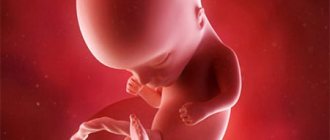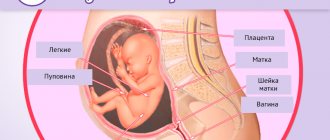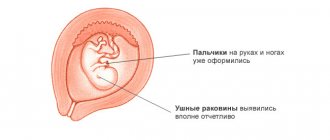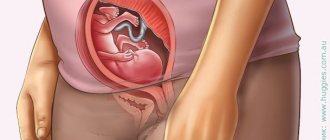The stomach hurts at the 19th week of pregnancy due to changes in the mother’s body, obstetric and non-obstetric pathologies. During the period of bearing a child, inflammatory processes and chronic diseases diagnosed before conception may worsen.
How long have you had this pain syndrome?
- Several days (26%, 976)
- First day (21%, 799 Votes)
- Several months (12%, 452)
- Week (10%, 376)
- Several weeks (10%, 358)
- About a month (8%, 312)
- Chronic form (6%, 236)
- About a year (6%, 210)
Total voters: 3 720
Loading …
Use search Are you having a problem? Enter “Symptom” or “Name of the disease” into the form, press Enter and you will find out all the treatment for this problem or disease.
Why does my stomach hurt at 19 weeks of pregnancy?
Week 19 is the fifth obstetric month.
Changes in the mother's body continue. The uterus continues to grow. The skin stretches. The muscles of the abdominal wall are in constant tension. There is a heavy load on the ligaments. Increased weight has a bad effect on the functioning of the musculoskeletal system. These changes cause pain. It is considered a non-dangerous obstetric pain, that is, it is associated with the characteristics of bearing a child.
You can relieve suffering by resting and taking a comfortable position. Such sensations differ from pathological and dangerous obstetric sensations in the absence of additional characteristic symptoms.
There are a number of dangerous conditions that are accompanied by unpleasant sensations. The woman feels the lower abdomen begin to tighten, discharge mixed with blood appears, the temperature rises, and severe vomiting begins.
Causes of these symptoms:
- Premature birth.
- Placental abruption.
- Increased uterine tone.
For these pathologies, an ambulance is called and hospitalization is performed.
Painful sensations are typical for non-obstetric pathologies that occur in any person and are not associated with pregnancy:
- cystitis is a dangerous inflammation of the bladder;
- pancreatitis is an inflammatory process affecting the tissue of the pancreas;
- cholecystitis - inflammation of the gallbladder;
- acute appendicitis;
- increased gas formation in the intestines;
- oncological diseases.
Treatment is carried out under medical supervision. Non-steroidal anti-inflammatory drugs are prescribed for inflammation. In some cases, surgery is performed to save the life of the mother and child. Pharmaceutical therapy is used for recovery and prevention.
For diagnosis the following is prescribed:
- Blood test (biochemical, erythrocyte sedimentation rate - shows inflammation).
- Ultrasound examination of the pelvic organs.
- Examination at an appointment with an obstetrician-gynecologist.
Lack of attention to existing health problems will lead to disastrous consequences. You need to monitor your own activity. Avoid high loads and overvoltage. Maintain a sleep and rest schedule. Consume permitted foods. Avoid bad habits.
Ultrasound at 19 weeks of pregnancy
The second screening includes, in addition to a biochemical blood test, an ultrasound test. It examines the collar area and nasal bone of the fetus. The specialist evaluates:
- fetal heartbeat;
- activity;
- identifies pathologies that are incomparable to life;
- size of the uterus and fetus;
- state of amniotic fluid;
- you can find out the gender of the baby.
By this time, the child has already established a sleep-wake schedule; he, like a newborn, sleeps for 16-18 hours. With an ultrasound, if you're lucky, you can catch the baby during the gameplay.
What causes nagging, aching pain during pregnancy?
Pain syndrome is provoked by obstetric factors:
- volume of the uterus;
- woman's body weight;
- condition of the musculoskeletal system;
- ligament extensibility;
- tone and elasticity of the abdominal muscles.
Discomfort due to illness:
- Inflammatory processes.
- Seasonal colds.
- Oncology of benign and malignant properties.
Self-medication is a rash decision.
To create a treatment plan you need:
- consult a doctor;
- undergo diagnostics.
Weight gain at 19 weeks of pregnancy
You should weigh yourself at the same time once a week. This is necessary to control weight gain. A pregnant woman gains approximately 300 grams per week. At 19 weeks of pregnancy, weight gain may be an individual factor. Around this period of pregnancy, women gain from 3 to 6 kilograms. The norm is calculated for each woman separately and depends on body weight, age, and general health. Only her leading doctor can assess the norm for a particular woman.
Important: the normal weight or weight gain at 19 weeks of pregnancy for one woman may be very different from the normal for another. During pregnancy, women must determine and control their weight gain. Physical activity, such as exercise, exercise and gymnastics for pregnant women, helps control weight.
Zootherapy for pain management
The practice of interacting with animals has been used in psychotherapy for quite a long time. As a result of exercise within 15 minutes, stress disappears, the rhythm of the heartbeat normalizes, and blood pressure normalizes. The effect is achieved due to the patient receiving positive emotions.
During pregnancy, it is allowed to use zootherapy in the absence of allergic reactions to animal fur. Communication practices that can be used:
- Dogs.
- Cats.
- Horses.
- Dolphins.
- Aquarium fish.
Zootherapy can reduce discomfort from non-dangerous obstetric pain.
What does dull, pulling, point or cutting pain in the abdomen indicate?
Stomach pain during pregnancy is due to changes in the body, in organs associated with hormonal changes, changes in the position of internal organs, and obstetric pathologies.
Many types of these sensations do not pose a threat to the health of the mother or the condition of the fetus. Others cause significant harm and even death to the woman and the unborn child.
Pain is a reaction of the nervous system to stimuli. A symptom of many diseases, including obstetric pathologies during pregnancy. A pregnant woman experiences hormonal changes and a restructuring of many systems. They are also accompanied by this feeling.
If discomfort and pain occur, it is better to consult with your doctor about the nature of these sensations and appropriate treatment. During pregnancy, a woman is responsible not only for her own health, but also for the health of the baby.
Nature has determined that the mother’s body tries to protect the fetus from all negative influences. A plug formed from mucus in the cervix prevents pathogenic microorganisms from entering.
Umbilical cord nutrition is formed in such a way that harmful chemical compounds do not enter the fetus. The uterus itself protects the child from external mechanical influence.
At the same time, during the period of bearing a baby, the woman herself may regularly experience pain of varying intensity and nature. Each type of discomfort indicates the presence of different pathological conditions, with the exception of harmless obstetric ones associated with changes in the maternal body and preparation for childbirth.
Based on the nature, intensity of pain, and gestational age, we can talk about how dangerous the condition is.
For example, pulling, extending to the lower back and groin, may indicate a risk of miscarriage. An additional sign of the condition will be the presence of bloody discharge.
In this case, you should immediately seek medical help and undergo an examination. If you delay visiting a doctor, the frequency of contractions will become more frequent and spontaneous miscarriage will occur.
Uterine tone is dangerous regardless of how early it was diagnosed. The fetus may experience a lack of oxygen and incoming nutrients. The woman feels a sharp pain like contractions. The solid state of the uterus and lower abdomen is recorded.
In case of injury, late toxicosis, or stress, placental abruption may occur. The condition is accompanied by acute pain in the lower abdomen. Often there is internal bleeding without external manifestations in the form of discharge. Urgent hospitalization and surgical intervention are required. Without help, death will occur.
Cramps accompanied by dizziness at five to twelve weeks can be a symptom of an ectopic pregnancy. For a number of reasons, the egg was unable to enter the uterus and became embedded in the fallopian tube.
As a result of the rapid growth rate of the fertilized egg, severe pain occurs. The woman is sent for an ultrasound examination. An operation to terminate the pregnancy is prescribed. Lack of medical care will result in death for the pregnant woman.
A number of non-gynecological problems also contribute to the occurrence of unpleasant sensations in the lower abdomen:
- Disruption of the gastrointestinal tract. Additional symptoms: bitterness in the mouth, tingling in the lower abdomen, heartburn.
- Inflammation of the bladder and urinary tract. Symptoms: discomfort and burning when urinating, increased frequency of the urge to urinate, increased body temperature.
- Seasonal colds. They are accompanied by headaches, nasopharyngeal congestion, aching bones, and fever.
- Inflammation of the appendix (appendicitis). An acute condition in which severe vomiting occurs, weakness, and a strong increase in temperature are detected. Surgery is used to remove the inflamed area. This procedure is safe for a pregnant woman. Abdominal laparotomy appendectomy is used if peritonitis is suspected and less invasive laparoscopy is used if there are no signs of peritonitis. A course of rehabilitation therapy is prescribed.
It is possible to diagnose the pathology based on additional symptoms. Treatment should be supervised by medical professionals. It is prohibited to take pharmaceutical drugs on your own. If you aggravate your own condition through inept actions, this will inevitably affect the child’s development.
Frozen pregnancy at 19 weeks of pregnancy
Not only at week 19, but throughout your pregnancy you need to listen to your body. Even the slightest discomfort, dubious symptoms and changes cannot be ignored. There are situations when the fetus freezes in the womb in the second trimester. However, most often this happens in the 1st trimester of pregnancy. Spontaneous abortion occurs. But there are cases when a miscarriage does not happen and the woman simply does not know about the missed abortion. A frozen pregnancy can be determined at the next gynecological examination or ultrasound examination. The first signs are that the size of the uterus does not correspond to the given stage of pregnancy, the fetal heartbeat cannot be heard, and there are no movements. At 19 weeks, frozen pregnancy is extremely rare.
Important: the absence of movement at 19 weeks of pregnancy does not mean that there is something wrong with the baby; they may appear later. At this stage, in multiparous women, movements should already be felt. But you cannot ignore routine examinations with a gynecologist.
When do you need to see a doctor urgently, and which doctor will help?
Cases of pain where medical intervention cannot be avoided:
- Cramping attacks of a pulling nature (especially in the first trimester of pregnancy) - you need to immediately seek help. There is a high risk of miscarriage or placental abruption. The presence of mucous discharge mixed with blood is a reason to call an ambulance for immediate hospitalization of the patient.
- Shingles with a return to the lower back in the presence of a burning sensation at the time of urination - signs of the development of pyelonephritis. Long-term treatment may be required. Signs of illness should be reported immediately.
- In the later stages, accompanied by contractions and increased uterine tone - a sign of premature birth.
Regardless of the stage of pregnancy, the appearance of bleeding from the vagina with or without pain - you should definitely call an ambulance.
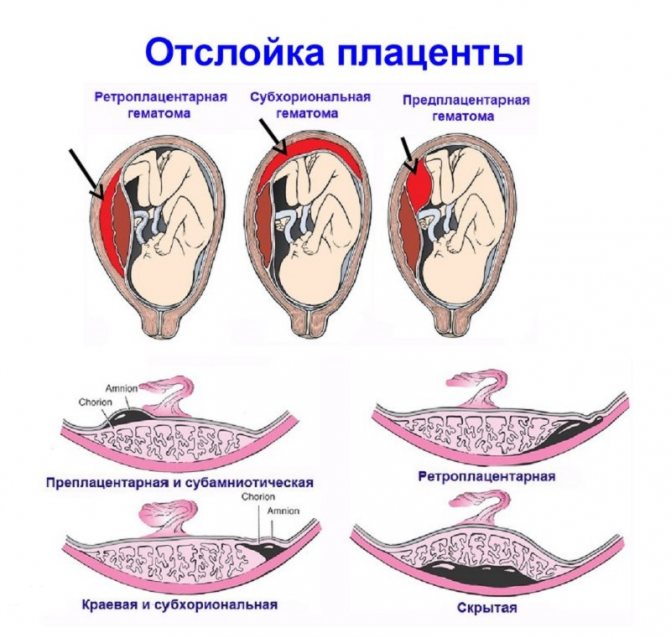
Consulting a pregnant woman and caring for the patient during pregnancy is the responsibility of the local obstetrician-gynecologist. They work in district antenatal clinics.
You can get an appointment with them in the following ways:
- through an electronic appointment system;
- by calling the registration number of the medical institution;
- Some consultations retained the journal recording system.
If the pain is not associated with the course of pregnancy and does not affect the development of the fetus, then you need to contact your local physician. It is important that treatment is selected taking into account saving the life and health of the mother and child.
Discharge at 19 weeks of pregnancy
At 19 weeks of pregnancy, vaginal discharge increases. They should not change their color or smell, but simply become more abundant. If their personality has changed, you should tell your doctor. Danger is represented by any shades of yellow, green, brown and if these discharges foam or smell. Such changes may indicate infectious diseases that require mandatory and immediate treatment. Thrush often appears during pregnancy, which must be treated before birth.
Top medications to reduce abdominal pain during pregnancy and breastfeeding, painkillers
Painkillers are not advisable during pregnancy. Especially in the first months, when the main formation of organs and tissues of the future person occurs. However, the process of experiencing discomfort caused by constant negative factors also does not bode well.
Before purchasing analgesics, consultation with a specialist is required. It is advisable to try non-pharmaceutical ways to cope with discomfort.
The least dangerous drug is Paracetamol. Suitable for use throughout the entire gestation period. Toxic components are in minimal concentration and are quickly excreted in the urine.
Ibuprofen is a non-steroidal anti-inflammatory drug. Prescribed with caution during the second trimester. Contraindicated for the first and third trimester. Use may cause a number of dangerous side effects. If your condition changes slightly for the worse while taking an analgesic, you should inform your doctor.
Indomethacin also belongs to the group of non-steroidal anti-inflammatory drugs. It is subject to the same restrictions as Ibuprofen. If taken continuously, there is a risk of damage to the child's kidney function.
For the first two trimesters, it is permissible to use creams and ointments based on:
- Diclofenac.
- Ketoprofen.
- Ketorolac.
In the third trimester, you can only use local products based on herbal ingredients. It is forbidden to apply them if they contain bee or snake venom.
Ointments with an irritating effect that stimulate increased blood circulation can also have a negative effect. There is a risk of developing uterine tone and high blood pressure.
The most powerful painkillers are classified as narcotic substances and are prohibited for free sale. Their use occurs only in a hospital with extremely severe pain. These are drugs based on morphine and codeine.
The list of chemical compounds for pharmaceutical use during pregnancy is extremely limited. Before you start taking it, you should read the instructions for use in detail and strictly follow the manufacturer’s recommendations on dosage and method of use.
It is important to familiarize yourself with the provisions on common side effects and contraindications.
It is possible to use folk and non-traditional methods of getting rid of suffering. For example, yoga for pregnant women, acupuncture, light massage, aromatherapy. Traditional methods are also used. But their use also needs to be discussed with a specialist.
Preventive measures to avoid abdominal pain
The basis of prevention is the correct lifestyle of a pregnant woman:
- No stress factors. The mental state of the mother is the key to the health of the child. The fetus inside a woman reacts sensitively to changes in the mother’s emotional background. He is not able to recognize the causes of depression or fears, but he is aware that adverse events are occurring. If the mother is very worried, there is a risk of pathological changes during the formation of the future person. Neurological and psychological problems are possible.
- Elimination of physical fatigue. Pregnant women are not recommended to attend training regularly. During active sports, blood pressure levels increase noticeably. This will provoke the development of uterine tone, which will inevitably lead to adverse consequences. You can go for walks in the fresh air.
- Properly designed diet and nutrition schedule. It must be balanced. You should not consume fast food products or preservatives; it is recommended to reduce the amount of tea and coffee. It should consist of vegetables, fruits, animal and plant protein. It is worth taking vitamins prescribed by a doctor for those who are pregnant. Weight control is required, since the percentage of subcutaneous fat outside the normal range negatively affects the functioning of the cardiovascular system and gastrointestinal tract. The feeding processes of the fetus are disrupted. With rapid weight gain, nutritional correction and a special diet may be prescribed. Excess weight contributes to decreased activity, bad mood, and additional pain in the back and joints. Make sure there is no overeating.
- Maintaining a sleep and rest schedule ensures that a woman is highly active. She does not feel tired and overwhelmed, which means she has a positive morale.
- Regular observation by an obstetrician-gynecologist according to the established schedule, passing mandatory tests, compliance with received medical recommendations. Undergoing developmental ultrasound examinations and other diagnostic measures.
- Tracking the development of chronic pathologies that were diagnosed before pregnancy.
- Prompt treatment of colds, bacterial and viral diseases acquired during pregnancy.
- Eliminate all bad habits, such as alcohol, smoking, and drug use. Failure to comply with this rule results in a developmental delay in the baby.
- Monitoring blood pressure for hypertension (high blood pressure) or hypotension (low blood pressure). Monitor your sugar levels if you are diagnosed with diabetes.
- Do not take a hot bath or shower, or a contrast shower. A sharp change in ambient temperature threatens a rise in pressure and disruption of the cardiovascular system.
Compliance with these rules will ensure comfortable and proper pregnancy. The pain will be considered obstetrically safe. But even if you follow all the recommendations, you need to carefully monitor your own condition and, if there are reasons, seek medical help.
What does sudden abdominal pain mean?
The suddenness of the development of pain is a sign of an acute form of pathology. If the sensation is localized on the right side, accompanied by nausea, vomiting, dizziness, there is a risk of developing inflammation of the appendix.
Immediate hospitalization and surgical intervention are required before perforation begins. Removing appendicitis is a common procedure for surgeons. It passes without complications.
During pregnancy, the operation is performed in compliance with all required patient safety criteria.
Non-obstetric types of pathological pain of a sudden acute nature include:
- intestinal obstruction;
- peritonitis.
As with appendicitis, acute pain accompanied by vomiting and general weakness. The syndrome extends to the lower abdomen, lower back, sacrum, and groin.
Unilateral, accompanied by bleeding from the vagina - a sign of ectopic pregnancy.
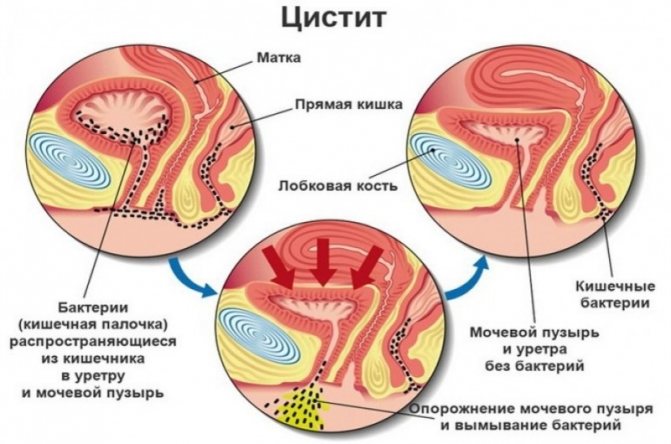
Additional signs of a dangerous condition:
- cramping character;
- increased symptoms in a horizontal position of the body;
- severe vomiting;
- shortness of breath at rest;
- frequent heartbeat, which in frequency goes above 100 beats per minute.
In the absence of medical attention, the fallopian tube ruptures. Internal bleeding begins.
Proper nutrition at 19 weeks of pregnancy
In order for the fetus to develop correctly, the expectant mother must eat properly and efficiently. Protein foods should predominate in the diet. If there are no digestive problems, it is recommended to eat more lean boiled beef, nuts, and legumes. It is worth excluding fried and very salty foods, and giving up spicy and smoked foods. You can’t eat too much sweets or flour.
The presence of foods rich in iron and calcium in the diet is encouraged. These include dried apricots, blueberries, tomatoes, buckwheat and oatmeal, beef, cheese and eggs, and any greens.
You need to eat in small portions, but often. You should not starve or overeat, this can cause many problems.
